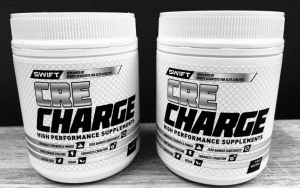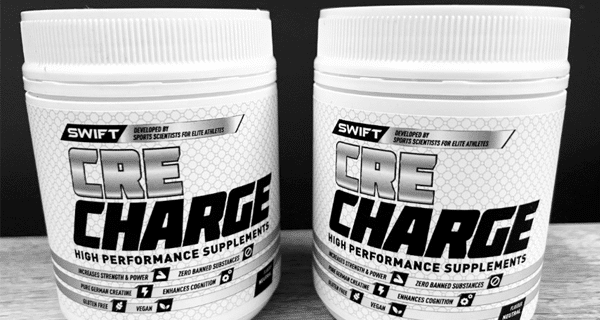
What is Creatine?
Creatine is a naturally occurring compound, made up of amino acids also known as the building blocks of protein.
The function of creatine is primarily for skeletal muscle energy production, with 95% of the body’s creatine stored here. The other 5% is stored in the brain, liver and kidneys.
Creatine is especially crucial for energy production during short periods of high-intensity exercise such as sprinting or weight lifting, and may be obtained through red meat, fish & poultry.
Creatine Supplementation
Creatine is one of the most extensively studied dietary supplements, with more than 300 studies evaluating its effects.It has been found to enhance performance in the following ways:
Resistance Training & Anaerobic Performance
Creatine supplementation allows for the rapid replenishment of the body’s phosphocreatine stores, leading to a higher rate of energy turnover by phosphocreatine in the form of ATP (Adenosine Triphosphate). This allows muscles to generate more force and power, leading to improved performance and explosive movements during activities such as resistance training & sprinting.
Body Composition
Creatine supplementation often results in water retention within the muscles (athlete dependent). This is due to the greater amount of water absorbed into the cells in order to store the extra creatine. This increase in intracellular water may result in a greater total body mass.
Rehabilitation & Recovery
It has been shown that creatine supplementation, along with carbohydrate intake, can promote greater muscle glycogen storage (fuel for muscles) than carbohydrate supplementation alone.
Glycogen replenishment is necessary for promoting recovery after exercise and preventing overtraining.
Including creatine supplementation may help athletes maintain optimal glycogen levels after they have depleted large amounts of glycogen during performance.
Some studies also provide evidence of fewer musculoskeletal injuries, muscle damage, inflammation & soreness when supplemented during training.
Sport Specific Performance
Some examples of areas that creatine supplementation is seen to positively affect performance are:
- Short distance running
- Jumping
- Throwing
- Combined track & field events
- Short distance swimming
- Cycling (during periods of intermittent, high-intensity performance)
Cognitive Processing
There is growing evidence to suggest the role of creatine supplementation in the improvement of athlete cognitive performance, alleviation of mental fatigue, reduced effects of sleep deprivation and improved memory. However, additional studies are needed to fully understand the impact of creatine supplementation on cognitive function in athletes.
Creatine Supplementation Strategies
There are two ways in which athletes may supplement creatine.
- Loading
- Daily Maintenance
Loading
This involves consuming 20-25g creatine per day for 5-7 days (often divided into smaller doses throughout the day). This is followed by a maintenance phase, often ranging from 3-5g per day thereafter until cessation.
This strategy is recommended if an athlete is hoping to maximize the ergogenic potential of creatine supplementation in a short period of time (<30 days).
Daily Maintenance
Involves 3-5g per day every day until cessation. This strategy is beneficial if the athlete is planning to ingest creatine over an extended period of time (>30 days). Daily maintenance takes a minimum of 4 weeks to experience similar skeletal muscle saturation levels as the loading strategy, however may avoid gastrointestinal issues which sometimes accompany loading.
Common Misconceptions
- Creatine supplementation does not always lead to water retention
- It is not an anabolic steroid
- When ingested at recommended dosages, does not result in kidney damage/renal dysfunction
- Majority of evidence does not support a link between creatine supplementation and hair loss/baldness
- Does not lead to cramping or dehydration
- Appears to be generally safe for children/adolescents, however more research is required
- Does not increase fat mass
- Loading phase is not required
- Studies show that creatine monohydrate to be the optimal choice of supplementation
Conclusion
Overall, creatine supplementation is a safe and popular choice among athletes due to its positive effects on overall athlete performance. As with any supplement, consulting with a healthcare professional is advisable to ensure individual safe and effective usage.
References:
- Avgerinos, K.I., Spyrou, N., Bougioukas, K.I. and Kapogiannis, D., 2018. Effects of creatine supplementation on cognitive function of healthy individuals: A systematic review of randomized controlled trials. Experimental gerontology, 108, pp.166-173.
- Hall, M., Manetta, E. and Tupper, K., 2021. Creatine supplementation: an update. Current sports medicine reports, 20(7), pp.338-344.
- Antonio, J., Candow, D.G., Forbes, S.C., Gualano, B., Jagim, A.R., Kreider, R.B., Rawson, E.S., Smith-Ryan, A.E., VanDusseldorp, T.A., Willoughby, D.S. and Ziegenfuss, T.N., 2021. Common questions and misconceptions about creatine supplementation: what does the scientific evidence really show?. Journal of the International Society of Sports Nutrition, 18, pp.1-17.

